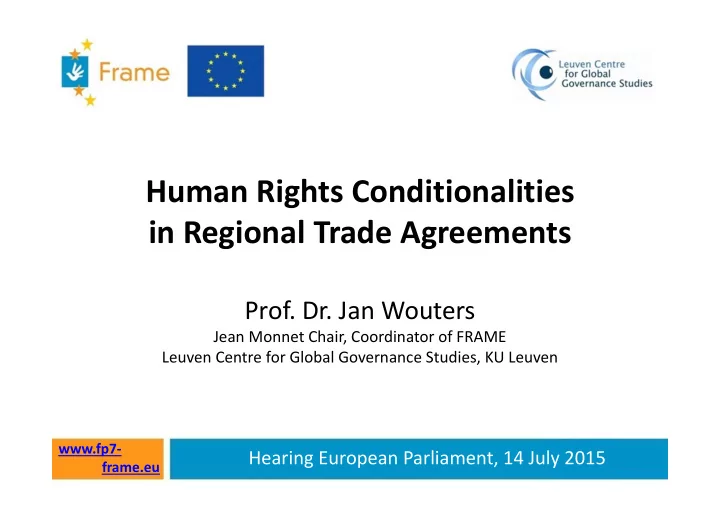

Human Rights Conditionalities in Regional Trade Agreements Prof. Dr. Jan Wouters Jean Monnet Chair, Coordinator of FRAME Leuven Centre for Global Governance Studies, KU Leuven www.fp7- Hearing European Parliament, 14 July 2015 frame.eu
Recalling the Treaty • Art 21 (1) TEU: ‘The Union's action on the international scene shall be guided by […] the universality and indivisibility of human rights and fundamental freedoms […].’ • Art. 207 (1) TFEU: ‘The common commercial policy shall be conducted in the context of the principles and objectives of the Union's external action.’ • Art. 21 (3) TEU: ‘The Union shall ensure consistency between the different areas of its external action and between these and its other policies.’
… and its operationalization • 2012 Strategic Framework and Action Plan: – ‘Make trade work in a way that helps human rights’ – ‘The EU will step up its effort to make best use of the human rights clause in political framework agreements with third countries’ – Action 33(b): ‘Develop criteria for application of the human rights clause’ • 2015 Action Plan: Action 33 (e): ‘Improve coherence in the application of human rights clauses which are systematically included in all new EU international agreements’
EU International Agreements (I) • Different types of agreements – ‘Pure’ trade agreements (FTA’s) – Trade and economic cooperation agreements – Association agreements – Enhanced association agreements (neighborhood, enlargement, ACP countries)
EU International Agreements (II) Trade and economic cooperation Pure trade agreements Association agreements Enhanced association agreements agreements •Colombia •Brazil •Kazakhstan •Morocco •Peru •EFTA •Kyryzstan •Egypt •Turkmenistan •Mercosur •Tajikistan •Algeria •Switzerland •Andean Community •Uzbekistan •Tunisia •South Korea (FTA) •Paraguay •Russia •Armenia •Central Africa (Interim EPA, •Argentina •Chile •Azebaijan Cameroon only) •Central America •South Africa •Georgia •Eastern and Southern African States •Mexico •Turkey •Moldova (Interim EPA) •Bangladesh •Ukraine •Pacific states (Interim EPA, Papua •ASEAN •Montenegro New Guinea and Fiji only) •Indonesia •Bosnia •Laos •Macedonia •Vietnam •Albania •China •ACP Countries •Sri Lanka •Jordan •Mongolia •Israel •Pakistan •Lebanon •India •South Korea (Framework Agreement) •Cariforum (EPA) •Gulf Cooperation Council •Yemen •Canada
Human rights clauses (I) • Early agreements: no link with human rights – Obligations to support and cooperate human rights-violating governments • Lomé IV (1989): Human rights are an element of cooperation • Early 1990’s: Human rights are an ‘essential element’ of the agreement – Rationale: suspension and counter-measures possible in case of Human rights violation
Human rights clauses (II) • Example of ‘essential elements’ clause: Respect for democratic principles and fundamental human rights, as laid down in the Universal Declaration of Human Rights, and for the principle of the rule of law, underpins the internal and international policies of the Parties. Respect for these principles constitutes an essential element of this Agreement. (EU- Colombia/Peru FTA 2013)
Human rights clauses (III) • ‘Non execution’ clause: If either Party considers that the other has failed to fulfil an obligation under this Agreement, it may take appropriate measures. […] In circumstances of particular urgency, appropriate measures may be taken without prior consultations. […] The Parties agree, for the purpose of the correct interpretation and practical application of this Agreement, that the term ‘circumstances of particular urgency’ […] means a case of the material breach of the Agreement by one of the Parties. A material breach of the Agreement consists in […] violation of the essential element of the Agreement […] (2004 EU-South Africa)
Human rights clauses (IV) • Negative and positive approach • Official policy since 1995: essential elements and non-execution clauses are included in all EU agreements • Evaluation?
Critique • Exceptions to insertion of human rights clauses – Sectoral agreements – Provisional application • Drafting and scope – Other essential elements next to human rights – Variation in references to human rights instruments – Sustainable development chapters
Critique • Monitoring and implementation – Essential elements clause rarely triggered – Selectively triggered? – Reasons for triggering? – Actual sanctions applied? • The case of investment treaties • Policy coherence?
Concluding remarks • In theory: human rights clauses are consistently present in most agreements • Concerns of – Effectiveness – Legitimacy – Credibility
Recommend
More recommend